Browse Topics
Categories
Format
Multimedia
Speakers Series
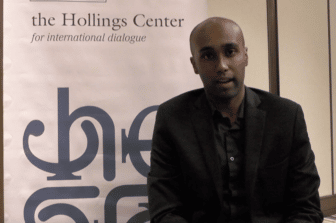
Prashanth Parameswaran on U.S. Policy towards the Association of Southeast Asian Nations (ASEAN)
Prashanth Parameswaran discusses what the United States needs to do in order to engage Southeast Asia collectively. He further discusses the role for U.S. security architecture in the region under the new administration. Prashanth Parameswaran is senior editor at The Diplomat based in Washington, D.C., where he writes mostly on Southeast Asia, Asian security affairs […]
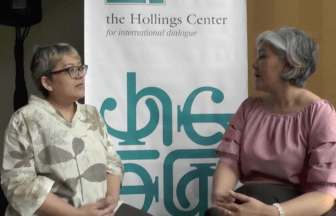
Desi Indrimayutri & Tina Jamaluddin on U.S.-ASEAN Economic Relations
Desi Indrimayutri & Tina Jamaluddin discuss why the ASEAN region is important to the private sector and U.S. investment success stories. Desi Indrimayutri is the US-ASEAN Business Council’s managing representative in Indonesia and its senior liaison with the Indonesian Government, the ASEAN Secretariat, the U.S. diplomatic presence in Indonesia and other key high-level stakeholders. The […]
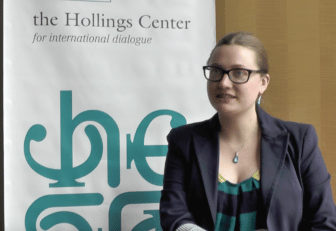
Courtney Weatherby on Non-traditional Security Issues in Southeast Asia
What are the main non-traditional security issues facing Southeast Asia today, and how can the US play a constructive role in helping countries in this region deal with these issues? Analyst Courtney Weatherby explains. Courtney Weatherby is a research analyst with the Southeast Asia and the Energy, Water, & Sustainability programs at the Stimson Center. […]
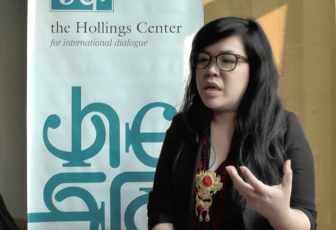
Christine Susanna Tjhin on China’s Engagement in Southeast Asia
What is the nature of China’s engagement in Southeast Asia? Is there a willingness on behalf of China to cooperate with the US on certain areas and issues? Christine Susana Tjhin explains further. Christine Susanna Tjhin is senior researcher at the Department of International Relations, Centre for Strategic and International Studies, Indonesia. She is also […]

Jeannie Sowers on Food Security Challenges and Practices in the MENA Region
Jeannie Sowers, Associate Professor of Political Science at the University of New Hampshire, discusses some of the obstacles to food security in the Middle East & North Africa, particularly the challenge of the inclusion of rural populations in food security strategies. She further highlights good examples from the region.
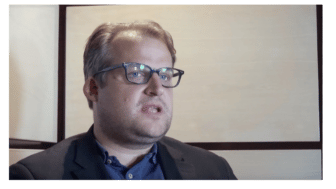
Martin Keulertz on Food Security in the Middle East & North Africa
Martin Keulertz, Assistant Professor at the American University of Beirut, discusses the challenges the MENA region faces in achieving food security and discusses possible ways to address those challenges. Most importantly, the outlook can be optimistic with attention to key issues and the development of new strategies.
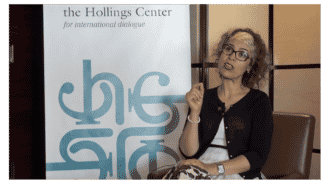
Ismahane Elouafi on Innovation and Investment in MENA Region Food Security
Ismahane Elouafi, Director General of the International Center for Biosaline Agriculture, discusses the innovation solutions that could be applied to improving food security in the Middle East & North Africa. She focuses on deploying small scale technological innovations, the importance of learning from older techniques, and the utilization of local, native crop varieties.
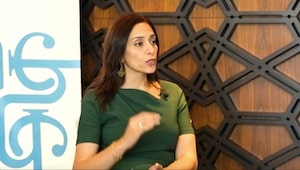
Charlotte Karam on Engagement of Business Stakeholders for Peace
Charlotte Karam, Associate Professor of Organizational Behavior and Associate Dean of Programs, Olayan School of Business at the American University of Beirut discusses the strategies used to bring together business stakeholders for the promotion of peace. For example, in some areas, businesses are starting to look beyond traditional customer relationships and are engaging other groups […]
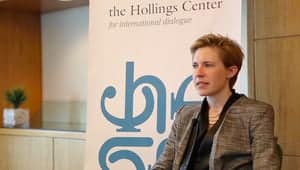
Catherine Long on U.S. Engagement Models in the Greater Horn of Africa
Independent researcher and consultant Catherine Long discusses the various models of engagement that recent U.S. administrations have pursued in relations with the Greater Horn of Africa. For example, she discusses the transition from U.S. aid having good governance conditionality to inclusion of trade goals to newer programs focused on specific health and infrastructure projects.
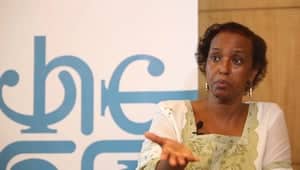
Rakiya Omaar on Traditional vs. Non-Traditional Actors in Somalia
Rakiya Omaar, the Director of the Horizon Institute – Somaliland, discusses the Somali perspective on what new actors such as Turkey and the Gulf Cooperation Council (GCC) bring to the table in Somalia in comparison to traditional actors such as the United States.
A non-profit, non-governmental organization dedicated to fostering dialogue between the United States and countries with predominantly Muslim populations in the Middle East, North Africa, South Asia, Eurasia and Europe
Stay Informed
Subscribe to our mailing list to stay up to date on our latest information.